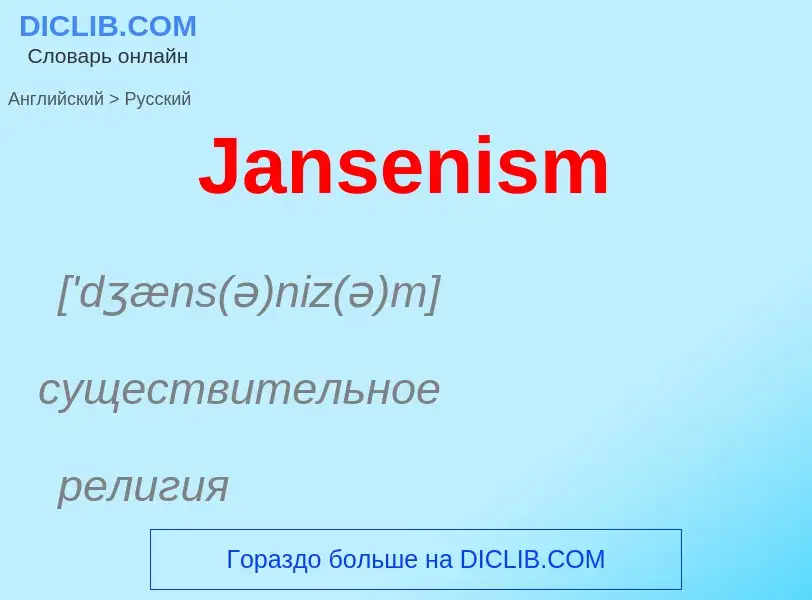Μετάφραση και ανάλυση λέξεων από την τεχνητή νοημοσύνη ChatGPT
Σε αυτήν τη σελίδα μπορείτε να λάβετε μια λεπτομερή ανάλυση μιας λέξης ή μιας φράσης, η οποία δημιουργήθηκε χρησιμοποιώντας το ChatGPT, την καλύτερη τεχνολογία τεχνητής νοημοσύνης μέχρι σήμερα:
- πώς χρησιμοποιείται η λέξη
- συχνότητα χρήσης
- χρησιμοποιείται πιο συχνά στον προφορικό ή γραπτό λόγο
- επιλογές μετάφρασης λέξεων
- παραδείγματα χρήσης (πολλές φράσεις με μετάφραση)
- ετυμολογία
Jansenism - translation to ρωσικά
['dʒæns(ə)niz(ə)m]
существительное
религия
янсенизм
Ορισμός
Βικιπαίδεια
.png?width=120)
Jansenism was an early modern theological movement within Catholicism, primarily active in the Kingdom of France, that arose in an attempt to reconcile the theological concepts of free will and divine grace. Jansenists claimed to profess the true doctrine of grace as put forth by Augustine of Hippo. In 1653, Pope Innocent X promulgated the bull Cum occasione, which condemned five errors attributed to Janesenism, including the idea that Christ did not die or shed his blood for all men.
The movement originated in the posthumously published work of the Dutch theologian Cornelius Jansen, who died in 1638. It was first popularized by Jansen's friend, Abbot Jean du Vergier de Hauranne of Saint-Cyran-en-Brenne Abbey, and after du Vergier's death in 1643, the movement was led by Antoine Arnauld. Through the 17th and into the 18th centuries, Jansenism was a distinct movement away from the Catholic Church. The theological center of the movement was Port-Royal-des-Champs Abbey, which was a haven for writers including du Vergier, Arnauld, Pierre Nicole, Blaise Pascal, and Jean Racine.
Jansenism was opposed by many within the Catholic hierarchy, especially the Jesuits. Although the Jansenists identified themselves only as rigorous followers of Saint Augustine of Hippo's teachings, Jesuits coined the term Jansenism to identify them as having Calvinist leanings. The apostolic constitution Cum occasione, promulgated by Pope Innocent X in 1653, condemned five cardinal doctrines of Jansenism as heretical, especially the relationship between human free will and efficacious grace, wherein the teachings of Augustine, as presented by the Jansenists, contradicted Jesuit thought. Jansenist leaders endeavored to accommodate the pope's pronouncements while retaining their uniqueness, and enjoyed a measure of peace in the late 17th century under Pope Clement IX. Further controversy led to the papal bull Unigenitus of Pope Clement XI in 1713, however, which condemned further Jansenist teachings. This controversy did not end until Louis Antoine de Noailles, cardinal and archbishop of Paris who had opposed the bull, signed it in 1728.

.png?width=200)
![La mère}} – [[Marie Angélique Arnauld]] (1591–1661), [[abbess]] of [[Port-Royal-des-Champs]]. La mère}} – [[Marie Angélique Arnauld]] (1591–1661), [[abbess]] of [[Port-Royal-des-Champs]].](https://commons.wikimedia.org/wiki/Special:FilePath/Angélique Arnauld Port Royal.jpg?width=200)
![Duvergier's]] death in 1643. Duvergier's]] death in 1643.](https://commons.wikimedia.org/wiki/Special:FilePath/Antoine Arnauld.jpg?width=200)
![Augustinus]]}} by [[Cornelius Jansen]], published posthumously in 1640. The book formed the foundation of the subsequent Jansenist controversy. Augustinus]]}} by [[Cornelius Jansen]], published posthumously in 1640. The book formed the foundation of the subsequent Jansenist controversy.](https://commons.wikimedia.org/wiki/Special:FilePath/Augustinus.jpg?width=200)
![[[Unigenitus Dei Filius]]}} in 1713, which condemned Quesnel and the Jansenists. [[Unigenitus Dei Filius]]}} in 1713, which condemned Quesnel and the Jansenists.](https://commons.wikimedia.org/wiki/Special:FilePath/Clement XI.jpg?width=200)
![Old University of Leuven]]. Old University of Leuven]].](https://commons.wikimedia.org/wiki/Special:FilePath/Cornelius Jansen by Evêque d'Ypres (1585-1638).png?width=200)
![Abbé de Saint-Cyran}} – [[Jean Duvergier de Hauranne]], abbot of Saint Cyran Abbey in Brenne (1581–1643), one of the intellectual fathers of Jansenism. Abbé de Saint-Cyran}} – [[Jean Duvergier de Hauranne]], abbot of Saint Cyran Abbey in Brenne (1581–1643), one of the intellectual fathers of Jansenism.](https://commons.wikimedia.org/wiki/Special:FilePath/Jean Duvergier de Hauranne.jpg?width=200)
![[[Pope Clement IX]] (1600–1669), whose intervention in the [[Formulary Controversy]] led to a 32-year lull (1669–1701) in the controversy over Jansenism known as the ''Peace of Clement IX''. [[Pope Clement IX]] (1600–1669), whose intervention in the [[Formulary Controversy]] led to a 32-year lull (1669–1701) in the controversy over Jansenism known as the ''Peace of Clement IX''.](https://commons.wikimedia.org/wiki/Special:FilePath/Pope Clement IX.jpg?width=200)
![[[Nuns]] being forcibly removed from the [[convent]] of [[Port-Royal-des-Champs]] in 1709 [[Nuns]] being forcibly removed from the [[convent]] of [[Port-Royal-des-Champs]] in 1709](https://commons.wikimedia.org/wiki/Special:FilePath/Port-RoyalRemoval.jpg?width=200)
![[[Unigenitus Dei Filius]]}}. [[Unigenitus Dei Filius]]}}.](https://commons.wikimedia.org/wiki/Special:FilePath/Quesnel.jpg?width=200)
